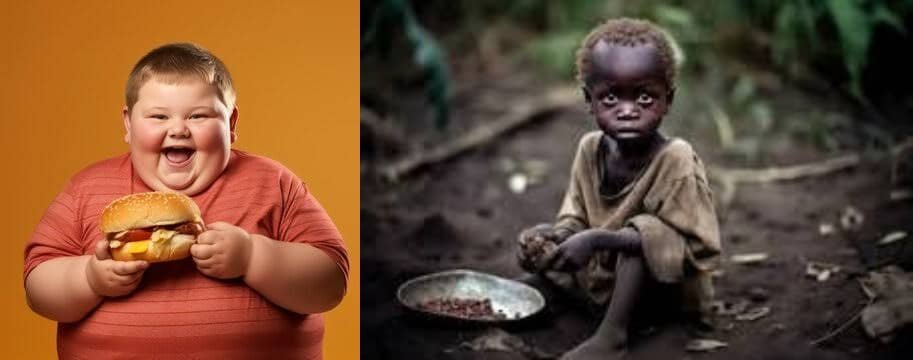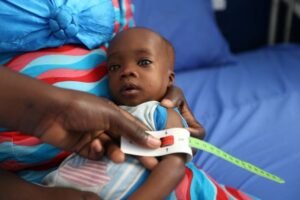
Two sides of Nigeria’s nutrition crisis: while millions of rural children face stunting and hunger, a growing number in cities struggle with obesity fuelled by junk food.
LAGOS, Nigeria – In the bustling streets of Lagos, children line up outside fast-food restaurants clutching bottles of fizzy drinks and packets of crisps. Meanwhile, in rural Borno and Katsina, their peers struggle to find a single nutritious meal a day. This stark contradiction is at the heart of a crisis that UNICEF warns could derail Nigeria’s future: the double burden of malnutrition and obesity.
In this report, Korede Abdullah explores UNICEF’s findings, the hidden health and economic costs, and why Nigeria must act now to protect its children from both hunger and overfeeding.
A Global Alarm: Obesity Overtakes Undernutrition
UNICEF’s latest report, Feeding Profit: How Food Environments Are Failing Children, highlights a startling reversal. Globally, obesity now affects more children than underweight. An estimated 188 million school-aged children and adolescents live with obesity, while another 391 million are overweight.
“This isn’t just about food, it’s about futures,” said Catherine Russell, UNICEF Executive Director. “Children raised on poor diets face higher risks of diabetes, heart disease, and even cancer.”
For Nigeria, this is more than a warning—it is a glimpse of a future that could strain hospitals and sink family incomes if urgent measures are not taken.
The Nigerian Paradox: Hunger Meets Obesity
Nigeria’s nutrition crisis plays out in two contrasting scenes. In rural communities, 11 million children suffer stunting, wasting, and food poverty. In urban centres, rising access to ultra-processed foods (UPFs) is fuelling a slow but steady rise in obesity.
“We are raising a generation where food companies, not families, dictate diets,” said Dr Martins Akinsola, a Lagos-based nutritionist. “If urgent steps are not taken, obesity will join stunting as a national epidemic.”
The paradox is brutal: one child starves, another grows overweight—both denied the chance of healthy growth.
Fast-Food Culture: The Silent Invasion
The spread of fast-food culture across Nigeria is no coincidence. Malls, supermarkets, and roadside kiosks are flooded with sugary drinks, fried snacks, instant noodles, and packaged sweets. These are marketed as modern and aspirational, seducing time-pressed parents.

Even schools are not spared. Snacks and fizzy drinks are handed out as rewards at competitions, while some companies donate UPFs under corporate social responsibility schemes. Experts warn this mirrors the very strategies that entrenched obesity in Mexico and the United States.
“Fast food is marketed as convenience,” Dr Akinsola observed, “but the long-term costs are devastating.”
Obesity’s Hidden Toll: Health and Economy Under Threat
Obesity is more than excess weight. Doctors warn it triggers type 2 diabetes, hypertension, cardiovascular disease, cancers, and psychological struggles such as depression and low self-esteem.

The economic stakes are equally frightening. UNICEF projects that by 2035, the global cost of obesity could exceed $4 trillion annually. In Nigeria, where hospitals already groan under the weight of malaria, maternal deaths, and malnutrition cases, experts fear obesity could push the system into collapse.
“We’re not just talking about waistlines,” Dr Akinsola stressed. “Every obese child today is a future economic burden on their family and the nation.”
Lessons from Abroad: Bold Steps That Work
UNICEF points to countries that have acted decisively to change the trajectory. Mexico, where sugary drinks and UPFs make up 40 percent of children’s diets, banned the sale of these items in public schools, benefiting over 34 million children.
Chile and the UK have adopted strict food labeling and marketing laws, while some Pacific nations are experimenting with subsidies for healthy foods.
For Nigeria, UNICEF recommends similar reforms: taxation on sugary beverages, transparent food labelling, subsidies for vegetables and grains, and strict bans on marketing UPFs in schools.
“Children need protection from predatory food marketing just as much as they need protection from harmful drugs,” argued Dr. Okoye. Nigerian policymakers, however, have been slow to regulate the industry, focusing instead on short-term tax incentives for food producers.
Experts warn that without reforms; Nigeria may fall into the same trap that has crippled other nations.
The Double Burden in Daily Life
Middle-class families in Lagos, Abuja, and Port Harcourt increasingly rely on quick, processed meals: noodles, fried chicken, chips, and carbonated drinks. These foods are cheap and convenient but poor in nutrients.

By contrast, traditional Nigerian diets—beans, yam, millet, and vegetables—remain healthier and often cheaper. Yet they are being abandoned in favour of westernised fast foods.
Schoolteacher Sheriffat Ibrahim expressed concern: “Parents cut costs on nutrition but spend heavily on gadgets and fashion. We are trading our children’s health for false convenience.”
What Nigeria Must Do: The Way Forward
Experts agree reversing the crisis requires multi-sectoral action.
The government must enforce labelling rules, regulate junk food advertising, and support farmers producing local staples.
Schools must promote nutrition education, ban UPFs, and encourage physical activity through sports and cultural events.
NGOs and civil society should lead awareness campaigns, support school farms, and hold food vendors accountable.
“Nutrition education is as important as vaccines,” argued fitness coach Bayo Adeyemi. “If families understand the risks, they can make better choices.”
Nigeria’s Future at Stake
The UNICEF report is not a distant warning—it is a mirror. Nigeria already lives with the consequences of undernutrition, and the shadows of obesity are lengthening. The choice is stark: act now or pay later.
Dr Ademola Ajibade, a public health physician, issued a stark reminder: “Healthy children are the foundation of national development. If we fail to nourish them today, we mortgage tomorrow’s Nigeria.”
Nigeria’s children stand at a crossroads: one path leads to wasted potential, the other to overweight futures. Unless leaders, parents, and communities act decisively, both roads may converge into a single crisis—a nation where children are both starving and overfed, yet none truly nourished.




